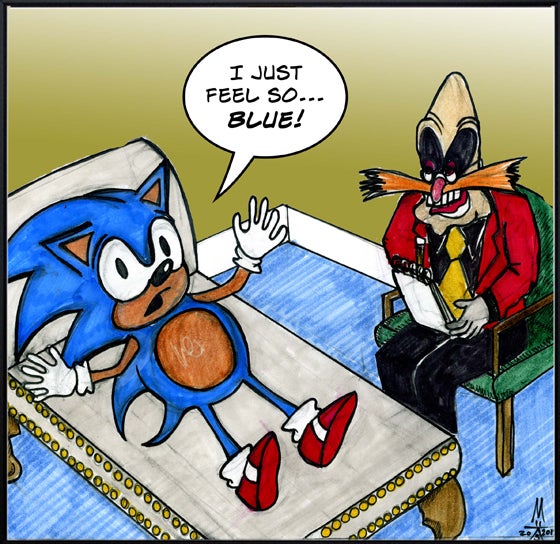Deconstructing Gaming: Sonic on the couch
The first in our semi-regular, and most certainly satirical, character assassinations of gaming's virtual icons.

Your support helps us to tell the story
From reproductive rights to climate change to Big Tech, The Independent is on the ground when the story is developing. Whether it's investigating the financials of Elon Musk's pro-Trump PAC or producing our latest documentary, 'The A Word', which shines a light on the American women fighting for reproductive rights, we know how important it is to parse out the facts from the messaging.
At such a critical moment in US history, we need reporters on the ground. Your donation allows us to keep sending journalists to speak to both sides of the story.
The Independent is trusted by Americans across the entire political spectrum. And unlike many other quality news outlets, we choose not to lock Americans out of our reporting and analysis with paywalls. We believe quality journalism should be available to everyone, paid for by those who can afford it.
Your support makes all the difference.Blue. A colour indicative of sadness, isolation, and desolation. An odd choice then for a certain bipedal hedgehog, a spiky symbol of defiance if you will, come to save his fellow woodland creatures, their environment , and perhaps even their very sentience from the red menace known as Dr. Robotnik.
Is Sonic so affected by the cutesy flickies plight that his pigmentation has been affected? Perhaps this explains the switch from the customary brown colouration of his fellow Erinaceinae to a deep blue; as the technological dominance of Robotnik provides him with an excuse to feel sorry for himself if ever he needed one.
With the ransacking of Sonic’s world a clear metaphor for modern society’s greed – a dark commentary of our capacity to turn what was meadow and river into industrial wastelands of smoke-belching factories and polluting power plants – surely our response would be one of maudlin sorrow too?
Not one to sit back and let despair take hold though, Sonic attempts to halt this ruthless advancement with a display of speed and power, but wait. Is his defiance the correct response?
Okay, so Robotnik’s policy of capturing the flickies and transforming them into metal automatons is – let’s say – a tad overzealous, but allow us to play devil’s advocate for a moment. Is Dr. Robotnik’s regime of mechanisation a much-needed modernisation of a backwards part of society? Is he pushing for progress while Sonic holds him back? In the end, aren’t we all willingly cocooned in technology? Would we rather go back to living in the woods? Is it not possible then, that Robotnik symbolises progress, rather than evil?
Before we give him a free pass, there are of course the obvious issues of Dr. Robotnik’s appearance and name to consider. Never since Stalin walked the earth has a man screamed communism (or at least what communism became) quite so loudly. But it’s wrong to judge him purely on this basis.
His dress sense is probably a holdover from his university days in the guild’s socialist society, or maybe his local clothes store only had red and yellow jackets left in his size (he is rather obese). Surely, we can’t hate the man because of his fashion sense. And as for his name, well, we can hardly blame him for that can we? After all, we don’t castigate Zowie Bowie, Buddy Bear Maurice Oliver and Cosima Violet Schiffer and for the devil-may-care attitude of their parents do we?
And what do we really know about Robotnik? A man of whom all we know for certain is that he seems to immensely enjoy the feeling of an outrageous ginger moustache pushed up against his lips. He’s bald, eccentric, and has an obesity problem. His large red nose points to an overindulgent love of booze, but he’s clearly an educated fellow. Has anybody even stopped to ask him what his doctorate was in? Perhaps he’s the Edison of Green Hills or the Isambard Kingdom Brunel of the Spring Yard Zone?
Given his credentials, could it be that the flickies are in favour of his modernisation drive and Sonic is just some spiky haired punk, a cowardly terrorist, imposing his ideals on the rest of us and slandering the good name of Robotnik? When Sonic saves his ‘friends’ from their metal ‘prisons’, do they stop to say ‘thanks’ or do they run as fast as they can?
Then there are those golden rings, the loss of which is duly marked by the sudden and abrupt end to Sonic’s progress and momentum upon contact with an enemy. Their loss is a metaphorical reminder that no matter how fast you go, or how far you progress, you will always be brought back to earth with a costly bump.
Yet why is Sonic so obsessed with amassing wealth? Is he some form of digital Robin Hood? Or could it be that he is the embodiment of capitalism rather than ‘Green’ ideals? A counterweight to Robotnik’s perceived communism.
What is that look on Sonic’s face when he collides with an ‘enemy’ and goes flying into the air, his previously concealed rings leaping from his conveniently invisible pockets? It’s not pain and surprise. No. It’s embarrassment, because, let’s face it, Sonic is no more than a blue-suited, fast-talking yuppie, pretending to care for a cause when he’s only in it for the cold hard cash. He plays the game, he knows the system. I can picture him now, talking to his unpaid, inexperienced intern, Tails, ‘Greed is good, my foxy friend. I’ll make us billions out of these fluffy schmuks; now pass me another cigar.’
Join our commenting forum
Join thought-provoking conversations, follow other Independent readers and see their replies
Comments